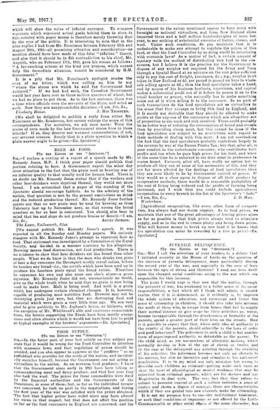FOOD SUPPLY.
(To ma 11D/TOR OF sue " SPEOUTOR."1 .Suk,—In the latter part of your last article on this subject you state that it would be wrong for the Food Controller to interfere. with economic laws, and that regulation of prices should be avoided, and you also appear to approve of the " profiteer " as an individual who provides for the needs of the nation, and incident- ally enriches himself, because the Goveenment are not acting as victuallers to the nation. As an overseas food producer, I know; that the Government since early in 1915 have been taking or i commandeering meat and dairy produce, and that last year they! also :took' the wool. ' The prices for these commodities were fixed 'by the Imperial -authorities and the Governments of the Dominions, or some of them ;'but, so far as the individual farmer -was concerned, he took no part in the negotiations, and during 'the first 'year of the 'war was satisfied with the prices obtained. 'The fact that higher prices have ruled since may have altered -his views in that 'respect, but that does not -affect the position .so far as' the food consumers in England are coneerned, and the Government to the extent mentioned appear to have acted with foresight as national victuallers, and from New Zealand alone imported three and a half million hundredweights of meat. last year, to say nothing of substantial amounts of butter, cheese, and wool. Under such conditions, do you maintain that it is undesirable to make any attempt to regulate the prices of this food, or that the Food Controller by so doing would be interfering with economic laws? As a matter of fact, a certain amount of mystery veils the method of distributing this food to the con- sumers, but I believe it is the practice for the Government ti dispose of any surplus not required for the Army and Nave through a Special Board at an advance on the cost price sufficient only to pay the cost of freight, insurance, dc.; e.g., surplus lamb taken in New Zealand at 6d. per pound is passed on here to whole- sale selling agents at 6d.; than the food speculator takes a hand, and by means of his business instincts, experience, and capital makes a substantial profit out of it before he passes it on to the retail butcher or grocer, who naturally has to make something more out of it when selling it to the consumer. In no part of such transactions do the food speculators net as victuallers in the sense that they arrange to bring this food to England, and it is surely not desirable that they should be allowed to make profits at the expense of the consumers which are altogether out of proportion to the- work and risk involved. There could probably be no better way of reducing the consumption of bread and cereal. than by providing cheap meat, but this cannot be done if the food speculators are subject to no restrictions with regard to their methods of dealing with this meat. I am not overlooking the fact that the food speculators probably contribute largely to the revenue by way of the Excess Profits Tax; but that, after all, is poor comfort to the unfortunate consumer, who contributes both profits and tax when he pays high prices for his food, and when at the same time he is exhorted to eat dear meat in preference le scarce bread. Farmers, after all, have really no option but to produce all they can of some of the necessaries of life, and they are far more affected by the dealings of food speculators than they are ever likely to be by Government control of prices. If they would as a class agree to dispose of all their produce by co-operative methods, there would be a reasonable probability of the cost of living being reduced and the profits of farming being increased, and I wish that you could include agricultural co-operation in every branch in the list of the Spectator's "fads."
[Agricultural co-operation, like every other form of co-opera- tion, has always had our warm support. As to food prices, we maintain that one of the great advantages of leaving prices alone as far as possible is that high prices always tend to stimulate supply, and so in the end to create plenty and bring down prices. Who will borrow money to break up new land if be knows that his speculation can never be rewarded by -a rise in price?—E,. Spectator.]


























 Previous page
Previous page